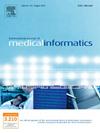Identifying and prioritizing competencies for health informatics master’s graduates to support the health sector transformation program in Saudi Arabia
IF 3.7
2区 医学
Q2 COMPUTER SCIENCE, INFORMATION SYSTEMS
International Journal of Medical Informatics
Pub Date : 2025-04-29
DOI:10.1016/j.ijmedinf.2025.105944
引用次数: 0
Abstract
Background
The 2030 Health Sector Transformation Program (HSTP) in Saudi Arabia includes digital health as one of its objectives. To achieve this transformation a knowledgeable and skillful workforce is needed. No research identifies the specific health informatics competencies needed to support HSTP’s objectives. Our study aims to identify and prioritize key competencies for health informatics master’s graduates needed to support Saudi Arabia’s digital health transformation strategies for 2030.
Methods
A series of semi-structured interviews were conducted with 17 health informatics experts in Saudi Arabia, identified through LinkedIn, with over 10 years of experience working on large-scale national projects. Interviewees were conducted in August and September of 2024. Experts ranked competencies based on their priority and alignment with HSTP’s digital transformation goals. The competencies were drawn from of the International Medical Informatics Association (IMIA) international recommendations in biomedical and health informatics (BMHI) educational framework, which served as the gold standard.
Results
A total of 37 competencies were ranked as high priority, 38 as moderate priority, and 5 as neutral. The top high-priority competencies for health informatics master’s graduates included change management, patient safety, data and information analysis, system security, business alignment, ethics, security and privacy, and leadership. The management science and social and behavioral domains were identified as the most critical for developing health informatics curricula and professional training programs. Two new competencies were identified: innovation, and emerging digital health technologies.
Conclusion
The findings reflect the changes that the healthcare system in the country is experiencing specifically related to data and digitalization as identified by the 2030 HSTP. There needs to be more standardized educational programs focused on the competencies needed for the workforce to contribute to the digital health transformation plans. These findings can serve as a standard guide in revising or establishing BMHI educational programs.
确定和优先考虑卫生信息学硕士毕业生的能力,以支持沙特阿拉伯的卫生部门转型计划
沙特阿拉伯的2030年卫生部门转型计划(HSTP)将数字卫生作为其目标之一。要实现这一转变,需要一支知识渊博、技能娴熟的劳动力队伍。没有研究确定支持HSTP目标所需的具体卫生信息学能力。我们的研究旨在确定并优先考虑支持沙特阿拉伯2030年数字健康转型战略所需的健康信息学硕士毕业生的关键能力。方法对17位沙特阿拉伯卫生信息学专家进行了一系列半结构化访谈,这些专家是通过领英(LinkedIn)确定的,他们在大型国家项目中有超过10年的工作经验。受访者于2024年8月和9月进行。专家根据其优先级和与HSTP数字化转型目标的一致性对能力进行排名。这些能力来自国际医学信息学协会(IMIA)关于生物医学和卫生信息学(BMHI)教育框架的国际建议,作为黄金标准。结果37项胜任力被评为高优先级,38项胜任力被评为中等优先级,5项胜任力被评为中等优先级。健康信息学硕士毕业生最重要的能力包括变革管理、患者安全、数据和信息分析、系统安全、业务一致性、道德、安全和隐私以及领导力。管理科学和社会行为学领域被认为是发展健康信息学课程和专业培训计划的最关键领域。确定了两项新的能力:创新和新兴的数字卫生技术。研究结果反映了该国医疗保健系统正在经历的变化,特别是与2030年HSTP确定的数据和数字化相关的变化。需要有更多标准化的教育项目,重点关注劳动力为数字健康转型计划做出贡献所需的能力。这些发现可作为修订或建立健康照护教育计划的标准指南。
本文章由计算机程序翻译,如有差异,请以英文原文为准。
求助全文
约1分钟内获得全文
求助全文
来源期刊

International Journal of Medical Informatics
医学-计算机:信息系统
CiteScore
8.90
自引率
4.10%
发文量
217
审稿时长
42 days
期刊介绍:
International Journal of Medical Informatics provides an international medium for dissemination of original results and interpretative reviews concerning the field of medical informatics. The Journal emphasizes the evaluation of systems in healthcare settings.
The scope of journal covers:
Information systems, including national or international registration systems, hospital information systems, departmental and/or physician''s office systems, document handling systems, electronic medical record systems, standardization, systems integration etc.;
Computer-aided medical decision support systems using heuristic, algorithmic and/or statistical methods as exemplified in decision theory, protocol development, artificial intelligence, etc.
Educational computer based programs pertaining to medical informatics or medicine in general;
Organizational, economic, social, clinical impact, ethical and cost-benefit aspects of IT applications in health care.
 求助内容:
求助内容: 应助结果提醒方式:
应助结果提醒方式:


